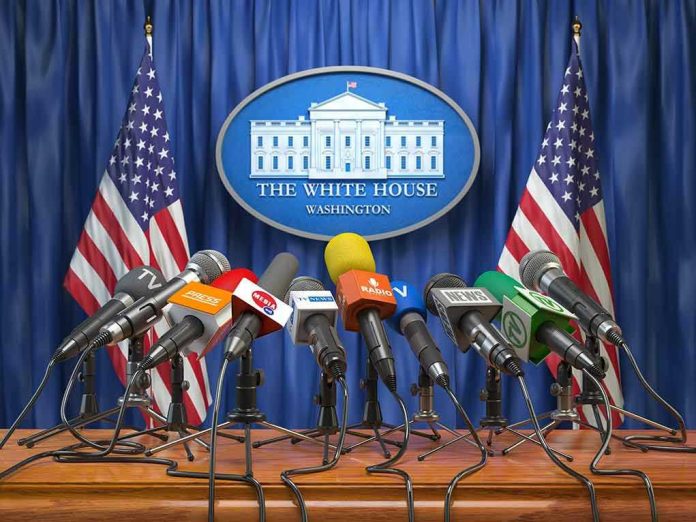
Laura Loomer’s unexpected entry into the Pentagon press pool sparks a debate about who should have access to sensitive government information.
Story Overview
- Laura Loomer, a controversial figure, receives Pentagon press credentials.
- The decision follows her public criticism of Fox News’ Pete Hegseth.
- The situation raises questions about press freedom and security.
- The Pentagon’s vetting process comes under scrutiny.
Laura Loomer’s Rise to Pentagon Access
Laura Loomer, known for her far-right activism and media presence, recently achieved an unexpected milestone by obtaining Pentagon press credentials. This development has sparked considerable debate, primarily due to Loomer’s contentious reputation and her recent public attacks on Fox News host Pete Hegseth. The timing of her credentialing, juxtaposed with her fiery rhetoric against a mainstream media figure, raises pertinent questions about the Pentagon’s press vetting procedures.
Loomer, often at the center of controversy, has previously been banned from major social media platforms for violating policies on hate speech and misinformation. Her entry into the Pentagon press corps challenges traditional norms and reflects broader changes within media landscapes, where boundaries between mainstream and alternative media are increasingly blurred. This situation exemplifies the tension between protecting institutional security and upholding the principles of press freedom.
The Pentagon’s Press Credentialing Controversy
The Pentagon, which serves as the nerve center of U.S. military operations, traditionally enforces a stringent press credentialing process. This process is designed to ensure that only journalists meeting specific standards of professionalism and security gain access. Loomer’s case, however, highlights potential gaps in this vetting system. Her credentialing, despite her history of inflammatory and confrontational behavior, puts the spotlight on how government institutions balance transparency with security.
Media watchdogs and advocacy groups have expressed concerns that credentialing figures like Loomer could undermine the professionalism of press briefings. Critics argue that individuals with histories of disruptive behavior should not gain access to sensitive government settings. Meanwhile, proponents of press freedom argue that denying access based on viewpoint sets a dangerous precedent.
WTAF?
Laura Loomer is now credentialed to cover the Pentagon. She’s too batshit crazy to be allowed to buy a gun but not to cover wars.https://t.co/29qMrsBtJC— Anarie Whit (@anarie_whit) November 4, 2025
Implications for Press Freedom and Security
The decision to credential Loomer has sparked a broader debate about the role of controversial figures in government press pools. Her presence in the Pentagon raises questions about the potential risks involved when figures known for confrontational tactics are granted access to sensitive information. Security analysts warn of the potential implications for institutional order and safety.
In the short term, Loomer’s credentialing has increased scrutiny of the Pentagon’s press processes, potentially leading to heightened tensions within the press corps. In the long term, this incident may prompt a reevaluation of credentialing policies across government agencies, setting precedents for how alternative media figures might access official channels.
Stakeholder Reactions and Broader Impact
Within media and political circles, Loomer’s credentialing has generated significant discussion. While Loomer herself has celebrated this as a victory for independent journalism, others view it as a troubling development. Pete Hegseth and his employer, Fox News, have vested interests in the controversy, as it directly relates to their credibility and security.
The broader journalistic community is concerned about maintaining professionalism and safety during press briefings. The story serves as a litmus test for how government institutions will handle press freedom in an era characterized by polarized media landscapes and evolving definitions of journalism.
Sources:
The New York Times, “Laura Loomer, Banned by Social Media, Runs for Congress,” 2019.
Anti-Defamation League, “Laura Loomer: Backgrounder,” 2023.
Mediaite, “Laura Loomer Gets Pentagon Press Credentials,” November 2025.
Politico, “Pentagon Press Office Responds to Loomer Credentialing,” November 2025.



